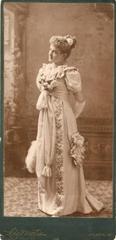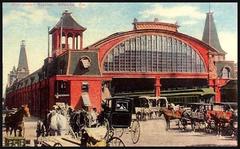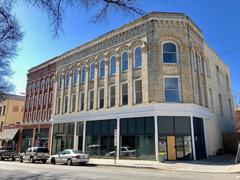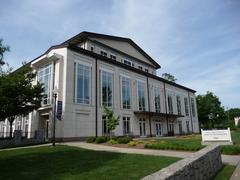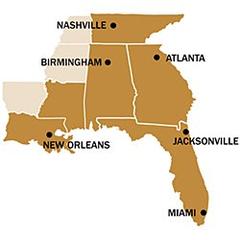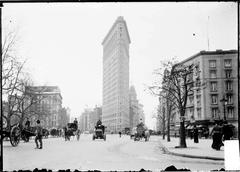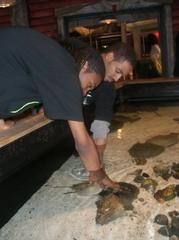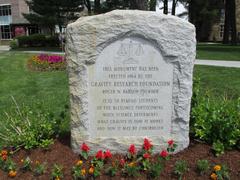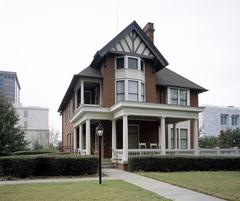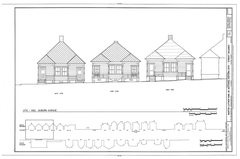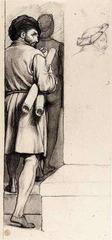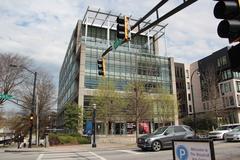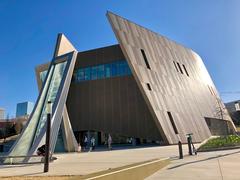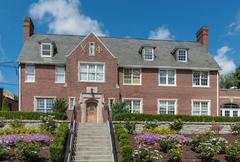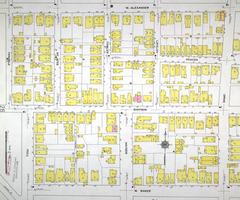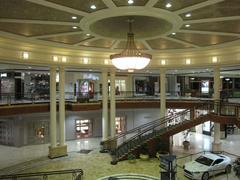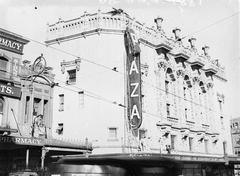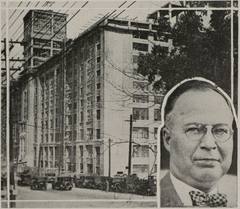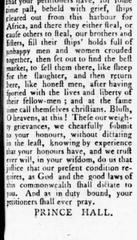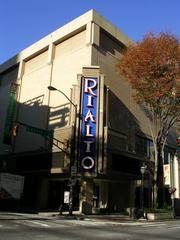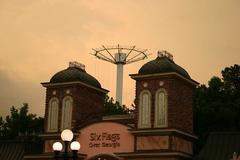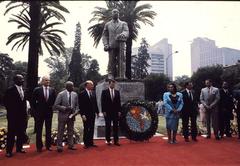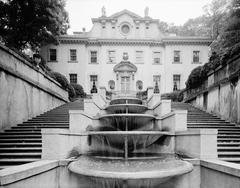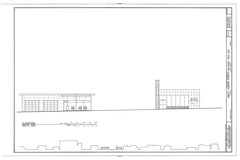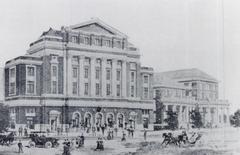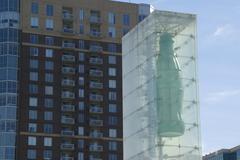
Annunciation Greek Orthodox Cathedral Atlanta: Visiting Hours, Tickets, and History Guide
Date: 04/07/2025
Introduction
Nestled in Atlanta, Georgia, the Annunciation Greek Orthodox Cathedral stands as a beacon of faith, culture, and architectural splendor. Established in 1905 as the city’s first Greek Orthodox parish, the cathedral today serves over 1,200 families and remains a vibrant spiritual and cultural center (Orthodoxy in America). Its iconic Byzantine-style edifice, topped with a gleaming gold dome, is a testament to both the enduring faith of Greek immigrants and the rich traditions they brought to the southeastern United States (Dekalb History Center).
Visitors can expect to be immersed in centuries-old Orthodox traditions through breathtaking iconography, mosaics, and sacred art set within an architecturally significant space. The cathedral also functions as the seat of the Archbishop of the Metropolis of Atlanta and welcomes people from diverse Orthodox backgrounds and the broader Atlanta community (WSGOC; Annunciation Cathedral).
Whether you are drawn by religious significance, architectural grandeur, or the vibrancy of Greek culture—especially during the annual Atlanta Greek Festival—this guide provides essential information on visiting hours, tickets, tours, etiquette, accessibility, and how to make the most of your experience (Atlanta Greek Festival).
Table of Contents
- Historical Background
- The Cathedral’s Role in Atlanta’s Greek Orthodox Community
- Liturgical Life and Sacred Art
- Architectural Highlights
- Visitor Information
- Frequently Asked Questions (FAQ)
- Summary and Final Thoughts
- References and External Links
Historical Background
Early Foundations and Immigrant Roots
Greek immigrants began arriving in Atlanta in the late 19th century, determined to preserve their Orthodox Christian faith and cultural traditions. In 1905, 72 founding members established the city’s first Greek Orthodox parish, holding services in rented downtown spaces (Orthodoxy in America).
Growth and Worship Spaces
As the congregation grew, worship moved to larger venues—a Presbyterian church, then a former Jewish temple—each move marking a step in the community’s expansion and integration into Atlanta’s diverse religious landscape (Kids Kiddle; Wikipedia).
Establishment and Architecture
In 1968, the parish relocated to its permanent home on Clairmont Road, unveiling a striking Byzantine-style cathedral crowned by a gold dome that quickly became a city landmark (Kids Kiddle). The cathedral’s artistic and architectural features—including a mosaic of Christ Pantocrator, richly decorated iconostasis, and stained glass depicting the twelve disciples—connect the Atlanta community to centuries of Orthodox tradition (Dekalb History Center; Wikipedia).
The Cathedral’s Role in Atlanta’s Greek Orthodox Community
Serving as the mother church for Greek Orthodox Christians in the region, Annunciation Cathedral is a focal point for worship, education, and cultural preservation (Atlanta Greek Festival). It is dedicated to the Annunciation of the Theotokos (Virgin Mary), commemorating a central event in Christian theology. The cathedral is also the seat of the Archbishop for the Metropolis of Atlanta, underlining its leadership role in the wider Greek Orthodox Archdiocese of America.
The parish welcomes people from all backgrounds, reflecting both the diversity and inclusivity of the modern Orthodox community (WSGOC).
Liturgical Life and Sacred Art
The cathedral follows the ancient liturgical traditions of the Eastern Orthodox Church. Services such as Orthros (Matins) and Divine Liturgy are held every Sunday, with special observances throughout the church calendar (Annunciation Cathedral Service Schedule). Services are primarily in Greek, with English incorporated for the wider community. For those unable to attend in person, live streaming is available (Annunciation Cathedral Livestream).
Inside, visitors are surrounded by sacred art—iconography, mosaics, and stained glass. The iconostasis and walls depict Christ, the Virgin Mary, saints, and biblical scenes, serving as both spiritual inspiration and visual storytelling (Atlanta Greek Festival Cathedral Tours).
Architectural Highlights
Exterior Features
Gold Dome: The cathedral’s most prominent feature, the gold dome, symbolizes the heavens and divine presence in Orthodox theology (Dekalb History Center). Its reflective brilliance is a beacon in the North Druid Hills neighborhood.
Arched Facades and Bell Tower: Rounded arches and a bell tower—housing a historic bell from the parish’s former location—are hallmarks of Byzantine design, connecting the current structure to its roots (Dekalb History Center).
Contrasts with Surroundings: The ornate exterior stands out among neighboring residential and modern buildings, making the cathedral a unique architectural landmark (Dekalb History Center).
Interior Design
Nave and Sanctuary: The spacious nave leads to the sanctuary, separated by a richly adorned iconostasis. The traditional cruciform floor plan draws focus to the dome and altar (Winston-Salem Greek Orthodox Church).
Iconography and Mosaics: Hand-painted icons and mosaics cover the walls and ceiling, visually narrating the life of Christ and the saints (Winston-Salem Greek Orthodox Church).
Natural Light: Sunlight streams through high-set windows and the dome base, enhancing the spiritual atmosphere (Dekalb History Center).
Materials and Craftsmanship
Quality materials—stone, stucco, marble, and gold-toned metals—are used throughout. Intricate woodwork, marble flooring, and hand-crafted furnishings often imported from Greece emphasize the community’s commitment to lasting beauty (Dekalb History Center).
Symbolism and Community Identity
The cathedral’s design is a living expression of Greek Orthodox theology and culture. Domes, arches, and sacred art root the building in ancient tradition while serving as a cultural hub—especially during events like the Atlanta Greek Festival (Annunciation Cathedral).
Visitor Information
Hours, Tickets, and Accessibility
-
General Hours:
- Monday–Friday: 9:00 AM – 5:00 PM
- Saturday: 10:00 AM – 4:00 PM
- Sunday: Open during services
Always check the official website for updates or changes, especially during holidays or special events.
-
Admission:
Free for all visitors; donations are appreciated. Special events (such as the Atlanta Greek Festival) may require tickets (Atlanta Greek Festival tickets). -
Accessibility:
Wheelchair access is available via ramps and elevators. Restrooms and parking are also accessible (visitor information page).
Tours and Special Events
Guided tours can be arranged through the cathedral office and are offered during major events, including the Atlanta Greek Festival. Tours highlight the cathedral’s history, iconography, and architecture. For bookings and schedules, consult the official website.
Etiquette and Dress Code
Visitors are asked to dress modestly and respectfully:
- Shoulders covered; avoid short pants except for young children.
- Dress as for a special occasion.
- No logos, slogans, or images on clothing.
- Women are encouraged to wear skirts or dresses; men should wear slacks.
- Head coverings are optional for women; men should remove hats.
- Remove visible piercings and cover tattoos if possible.
More details are available on the dress code page.
Family Guidelines
Families are welcome. Parents should supervise children; a cry room is available for use during services (family guidelines).
Facilities and Amenities
- Restrooms: Located in the classroom building and fellowship hall.
- Fellowship Hall: Open after services for social gatherings.
- Parking: Ample on-site, with additional arrangements during festivals.
Travel Tips and Nearby Attractions
- Location: 2500 Clairmont Rd NE, Atlanta, GA 30329
- Public Transit: Accessible via MARTA bus routes.
- Nearby Sites: Atlanta History Center, Margaret Mitchell House, Stone Mountain Park, and Decatur Square.
Arrive early during services or festivals for the best parking and seating.
Frequently Asked Questions (FAQ)
Q: What are the cathedral’s visiting hours?
A: Monday–Friday, 9:00 AM–5:00 PM; Saturday, 10:00 AM–4:00 PM; Sunday during services. Confirm exact times online.
Q: Is there an admission fee?
A: No, admission is free except for special ticketed events.
Q: Are guided tours offered?
A: Yes, particularly during the Atlanta Greek Festival and by appointment.
Q: Is the cathedral wheelchair accessible?
A: Yes, with ramps, elevators, and accessible restrooms.
Q: Can I take photos inside?
A: Yes, but please avoid flash and be respectful during services.
Q: What should I wear to the cathedral?
A: Modest, respectful attire; see the dress code guidelines above.
Q: Are families with children welcome?
A: Absolutely; a cry room is available for young children during services.
Summary and Final Thoughts
The Annunciation Greek Orthodox Cathedral is a cornerstone of Atlanta’s spiritual, cultural, and architectural landscape. From its historic roots among Greek immigrants to its current role as a major religious and cultural hub, the cathedral offers visitors access to a living tradition—expressed in its stunning Byzantine architecture, sacred art, and vibrant community events (Orthodoxy in America; Dekalb History Center).
Open to the public with free admission, the cathedral provides opportunities for personal reflection, guided learning, and festive celebration—especially during the renowned Atlanta Greek Festival (Atlanta Greek Festival). Careful attention to accessibility, visitor etiquette, and family-friendly policies ensures that everyone can enjoy a meaningful visit.
To maximize your experience, check the official website for current schedules and events, follow dress and etiquette guidelines, and consider exploring nearby Atlanta attractions. For personalized travel guidance and audio tours, download the Audiala app.
A visit to Annunciation Greek Orthodox Cathedral is not just an encounter with a historic building, but a chance to step into the heart of Atlanta’s Greek Orthodox heritage—an experience of faith, culture, and architectural beauty.
References and External Links
- Orthodoxy in America, 2024, Parish Highlight: Annunciation Greek Orthodox Cathedral Atlanta, Georgia
- Dekalb History Center, History of the Annunciation Greek Orthodox Church and the Atlanta Greek Festival
- Wikipedia, Annunciation Greek Orthodox Cathedral (Atlanta)
- Winston-Salem Greek Orthodox Church, Our Faith: Architecture
- Annunciation Greek Orthodox Cathedral official website
- Atlanta Greek Festival, Official Website
- Atlanta Greek Festival Tickets
- Kids Kiddle, Annunciation Greek Orthodox Cathedral (Atlanta)



